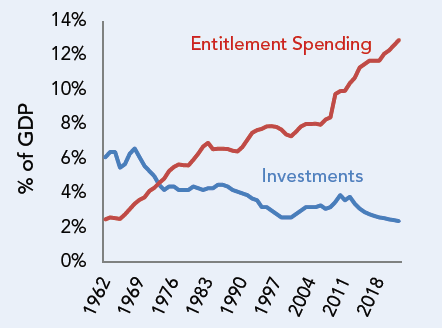Tyler Cowen's Blog, page 475
August 3, 2012
Investment vs. the Warfare-Welfare State
In Launching the Innovation Renaissance and my Atlantic article The Innovation Nation vs. the Warfare-Welfare State I showed that the Warfare-Welfare state has crowded out federal investment in research in development.
In a short report titled Collision Course: Why Democrats Must Back Entitlement Reform, Jessica Perez, Gabe Horwitz, and David Kendall cut the data in a slightly different way but come to the same conclusion:
Entitlements are squeezing out public investments. In 1962, spending on investments was two and a half times that of entitlements. But today, as a result of this Great Inversion, entitlement spending is three times that of investments. And this trend will only accelerate in time as the Baby Boomers retire and their benefits grow faster than inflation and wages.
…The fact that entitlement spending is crushing investments is bad news for U.S. growth.
Hat tip: Arnold Kling.
What is a socially optimal level of bike-riding danger?
Maxim Massenkoff writes to me:
You’ve blogged about bike laws before; I have a question about a particular cyclist (me). As bikers go, I’m very considerate. I obey red lights and stop signs. But I’ve noticed that many DC drivers expect me to break the law, eg., if one reaches an intersection a little before me, he’ll often get frustrated when I stop and give him the right-of-way.
This makes me wonder: if my only goal is to save other bikers from injury and death, should I follow or break the rules? Say that right now 50% of bikers break rules and 50% don’t. Then I figure most normal drivers will be cautious and hesitant around bikers. But if only 5% break rules, then cycling for that subset is way more dangerous as drivers will expect law-abiding bikers.
This model is rather simplistic, as it certainly goes both ways–bikers adjust their strategies to the habits of drivers. But we can consider DC and the marginal effect of one additional rule-abiding or rule-breaking cyclist. Which side should I choose, given my selfless utilitarian preferences above?
July 30, 2012
China fact of the day
China’s internet economy reached CNY 94.34 billion in the second quarter of 2012, a year-on-year increase of 66.1%.
That is from Izabella Kaminska, citing Chinascope.
July 29, 2012
Krugman on income mobility
Krugman wrote:
True, Cowen isn’t advocating a complete caste society — but it’s actually not clear why, since he is suggesting that we’ll be happier as a society if people stay comfortably in the class into which they were born.
He compares my position to this poem:
The rich man in his castle,
The poor man at his gate,
God made them high and lowly,
And ordered their estate.
Uh, no. What I wrote was that for fixed levels of income there was no gain per se from having a higher rate of mobility churn, if not accompanied by higher standards of living. I also wrote that the best way to get useful upward mobility was to have a high rate of economic growth and spread across many income classes. Think of it as the difference between positive-sum notions and metrics of mobility vs. zero- or negative-sum notions and metrics. Read my first point:
If the general standard of living is rising (and I am more than willing to admit problems in this area for the United States), mobility takes care of itself over time. I find it more useful to focus on slow growth, if indeed that is the case. Just look at income growth for non-wealthy families and that is more useful than all the mobility measures put together.
Or read my follow-up post:
I see two big and very real problems: slow income growth for many income classes and a problem with excessively high returns to finance at the very top.
Let’s put it this way. Paul Krugman is a great economist. But of all the people in my RSS feed, in terms of his quality and skill as a reader, he is not in the top 90 percent.
Signaling flips
A while ago Bryan and Arnold had an interesting exchange as to whether on-line education might ever “flip” into being a higher-status signal than is currently the case. A conversation with Karina points me to one interesting example of a signal status flip, this time from Beirut (and possibly other places as well?):
Apparently, here in Beirut, nose jobs have become so popular that those who cannot afford them, or don’t even actually need them, can still opt to wear bandages across their nose…to fake a nose job. Yup. The newest trend to hit the Beirut fashion scene is the post-op nose bandage.
There is a bit more here.
Assorted links
2. Chongqing video for Karl Marx.
3. A short history of toilet paper, and there is no great stagnation.
4. What are the rates of tax evasion on various Greek islands?
What does a contract with Coursera look like?
The contract [with University of Michigan] reveals that even Coursera isn’t yet sure how it will bring in revenue. A section at the end of the agreement, titled “Possible Company Monetization Strategies,” lists eight potential business models, including having companies sponsor courses. That means students taking a free course from Stanford University may eventually be barraged by banner ads or promotional messages. But the universities have the opportunity to veto any revenue-generating idea on a course-by-course basis, so very little is set in stone.
And this stunner:
When and if money does come in, the universities will get 6 to 15 percent of the revenue, depending on how long they offer the course (and thus how long Coursera has to profit from it). The institutions will also get 20 percent of the gross profits, after accounting for costs and previous revenue paid. That means the company gets the vast majority of the cash flow.
The full story is here, and for the pointer I thank my colleague Debra Lattanzi.
July 28, 2012
Is Modern Music Boring?
Here, via Kevin Drum, is statistical evidence that modern pop music is boring or at least more homogeneous than in the past (yes, Tyler already linked to Kevin’s post but I wanted to link to the underlying dataset (see below)).
We find three important trends in the evolution of musical discourse: the restriction of pitch sequences (with metrics showing less variety in pitch progressions), the homogenization of the timbral palette (with frequent timbres becoming more frequent), and growing average loudness levels.
The picture at right shows the timbral variety:
Smaller values of β indicate less timbral variety: frequent codewords become more frequent, and infrequent ones become even less frequent. This evidences a growing homogenization of the global timbral palette. It also points towards a progressive tendency to follow more fashionable, mainstream sonorities.
The underlying data is from the Million Song Dataset which looks pretty cool and is open.
Medicaid wars, continuing
Phil Galewitz and Matthew Fleming surveyed all 50 states to find out how Medicaid budgets are changing. They found that 13 states had made cuts this year..Seven have Democratic governors; six are led by Republicans. Three are in the south and an equal number are in New England. Two, California and Connecticut, seem to really like the Medicaid program: They volunteered to start the health law’s Medicaid expansion early, well before it’s required in 2014. Others, like Louisiana and Florida, are not fans at all: They plan to sit out that Obamacare provision.
All told, it’s pretty hard to find any narrative that explains why these states have cut their Medicaid programs, aside from some broad truths: Budgets are still squeezed and Medicaid is eating up a growing chunk of state spending.
From Sarah Kliff, here is more.
Assorted links
1. The ice cream market in Afghanistan; “”Security is not a concern when selling ice-cream”…
2. English phrases common only to India.
3. How to play in someone else’s band.
4. Is modern pop music boring?
Tyler Cowen's Blog
- Tyler Cowen's profile
- 844 followers





